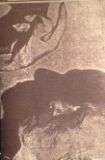 CROWLEY, ALEISTER Poems And Invocations CASSETTE (TPOS) 7.99
CROWLEY, ALEISTER Poems And Invocations CASSETTE (TPOS) 7.99There have been a gajillion different versions of the collected wax cylinder recordings and acetates of the Great Beast (purportedly recorded between 1910 and 1914) since the 1970s that originally were recorded all the way back in 1920 as The Great Beast Speaks. These editions really started popping up on underground industrial/occult labels in the 1980s cassette culture, with versions put together by Thee Temple Ov Psychick Youth and Incubator, and the oft-sourced LP edition on Goetia from 1986 (titled The Hastings Archives / The World As Power) being the first real complete vinyl release of these recordings (it was soon followed by another "bootleg" LP simply titled Aleister Crowley which included liner notes from Current 93's David Tibet - I've been looking for just a facsimile of those for years). And the terrific weirdo-culture label TPOS jumped into the fray as well, producing this cassette version of Crowley's famed spoken-word recordings in 1990 that has remained in print ever since, as far as i can tell. The specific track list and order on Poems And Invocations is exactly the same as the Goetia LP, so I suspect that these recordings were pulled from there, especially since the sound quality on Invocations is better than most of the other Crowley tapes that I've heard. I dig how TPOS made a point to delineate the ritual recordings from Crowley's poetry readings, with the former on the A-side and the latter on the back. Keeping these two different sessions slightly separated enhances the listening experience, at least for me.
I'm not concerned with the debates surrounding Crowley's delivery of the legendary Enochian Calls and whether or not his pronunciations were correct - I'm just glad that I can hear the man doing his thing. For anyone interested in early 20th century magick, Thelema, Golden Dawn, etc., the four tracks are fascinating to listen to. Crowley invokes "The Call Of The First Aethyr " and "The Call Of The Second Aethyr ", each one first attempted in the original Enochian text, then followed by his reading of the English translation. Obviously the fidelity on these ritual recordings are primitive and murky at best; the century-old technology used to record this work immediately left a patina of great age and aural obfuscation on the material; I've noticed that the recordings posted online have attracted some small following of ASMR fans who respond to the crackling, dust-caked, distant feel of the recording, the air filled with scratches of time and wear on crumbling grooves. That newfound aspect of this just makes everything around these Crowley recordings even weirder, as they find their way into the digital age.
The poetry featured on side two is of greater interest to me, actually. I'm a huge fan of his pornographic, scatological verse collected in his book White Stains; there are lines in there that black metal lyricists would have killed to come up with. The poetry recording is made up of ten individual spoken pieces, and as is the case with his written verse, the quality can vary. Pieces like the heartsick paean to love "La Gitana" and the flowing dreamstate of "At Sea" can somewhat resemble the surrealist visions of Breton, though not quite reaching the same ecstatic heights; also unusual is the declaratory meter of "The Pentagram", the bawdy tribute to whoredom "One Sovereign For Woman", the weird warnings of "Fingernails", and "Excerpts From The Gnostic Mass", which drifts off from your speakers like a homily, strange and profane. Lesser works like the self-referential "The Poet", his eulogy to "The Titanic", and the celebratory cadence of "Hymn to the American People on the Anniversary of Their Independence" are still important to hear, even if just as a historical piece. But the weirdest of all of this stuff is the song "Viva La France" at the very end, which Crowley belts out alongside piano accompaniment - it's a fittingly perverse and unexpected burst of jocularity from the guy, who here hardly sounds like the great degenerate and icon of "evil" of his era. I love it. I really get the impression from some of these readings that Crowley was a romantic at heart.
Alongside Austin Osman Spare, there's no arguing that Aleister Crowley really was the most notorious and influential occultist of the 20th century, and he lives still, his voice a spirit revived from ancient pieces of wax and aluminum.

